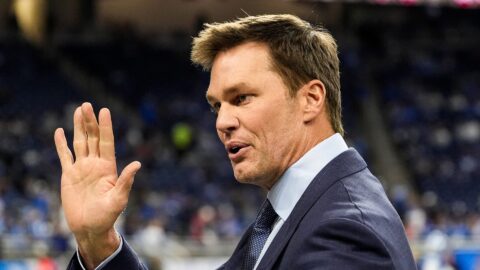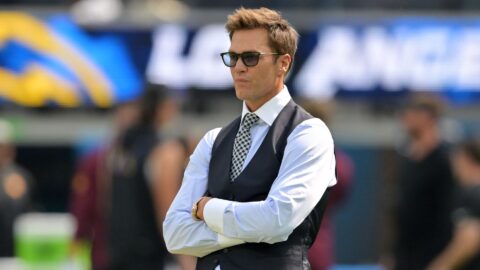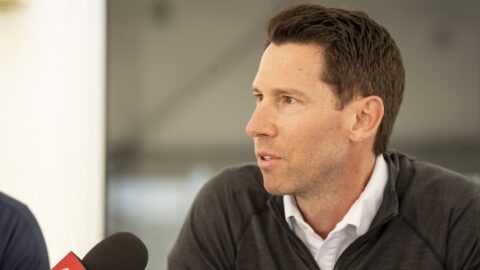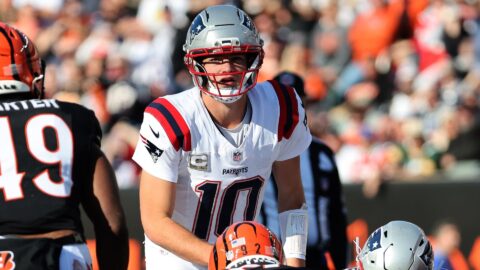BOSTON — The Red Sox gathered at Fenway Park on a sunny Monday afternoon, but there was no batting practice to take, no bullpen sessions to throw. No Game 4 of the division series against the Angels to play.
Everything ended so abruptly with Sunday’s 7-6 loss in Game 3, even manager Terry Francona said he felt the Pavlovian urge to make out a lineup card.
“Tito and I were talking about it. It feels like it ended prematurely,” Red Sox general manager Theo Epstein said. “On one hand, we’re not sitting here saying that the way we played, we deserve to keep going, because we didn’t. We just didn’t expect this. We thought we were relatively rested, relatively healthy and talented enough to make a little bit of a run here, and we have a feeling of being unfulfilled because it didn’t happen.
“We have no one but ourselves to blame, and we have to live with that and move on. So how does one feel the day after something like that? Probably a little [ticked], a little disappointed, and ready to try to do it next year with a better outcome.”
The process of building the 2010 Red Sox is already underway. Will Jason Bay be back in a Red Sox uniform? Will a down year for outfield free agents make Bay — who established career highs in 2009 with 36 homers and 119 RBIs — a more lucrative target for someone else?
“As much as I have no qualms about coming back here — I’d love to come back, I’ve made no bones about that — I’ve also gotten to this point, and I’m a little bit interested to go through the whole [free-agent] process and see what it’s like and see what’s out there,” Bay said.
Epstein says the Red Sox want Bay to return, yet the two sides — even after nine months of negotiations — haven’t been able to strike a deal.
“It’s been a really unusual negotiation,” Epstein said. “The fact that we want to keep him and he wants to stay here, yet we’ve been unable to reach a deal. And I don’t think either side has been unreasonable. I don’t think either side has been too conservative or not aggressive enough or not proactive enough. It just hasn’t happened, and it’s been disappointing that it hasn’t, and I don’t think he’s to blame for it. I don’t think we’re to blame for it. It just hasn’t happened yet, and I hope it does.”
As for the players who remain under contract, including those entering their final seasons (Josh Beckett, David Ortiz, Victor Martinez, Mike Lowell), 2010 could well be their final opportunity to win a World Series in Boston. Epstein said the minor league system is poised for another infusion of talent around 2011-12 — much like the wave that produced Dustin Pedoria, Jacoby Ellsbury, Jon Lester and Clay Buchholz in 2006-07 — which could precipitate a major roster turnover.
“I think next year will be perhaps the last year of this main group of players,” Epstein said. “I think it might be one more chance for this group to go out and win the whole thing. There’s probably 10 guys who are in their mid-20s or right around 30 who we can really build around, and then a strong farm system and tremendous payroll flexibility going forward. It might not happen this offseason — it might happen the next offseason — but in the years ahead, I think we have the ability to make a transition.”
Other points of concern Epstein touched upon on Monday:
What areas can the team improve upon?
“If you look back at this year’s club, I think we weren’t the defensive club that we wanted to be. So there’s room for improvement with our overall team defense, our defensive efficiency. And then offense on the road — we didn’t really hit on the road at all this year. We’ll take a look at seeing if there’s a way to improve that a little bit. Those are probably the two biggest things that stand out for me.
“Obviously, we’re going to be a better hitting team at Fenway. The disparity between our home and road performance was pretty extreme this year. And I think there are certain players who don’t have enough power to go out on a regular basis in some of the bigger ballparks on the road but do have the ability to get the ball off or over the wall at Fenway. We’re not going to tailor our entire offseason or anything around that. It’s just one of probably hundreds of nuances that go into team construction.”
Can David Ortiz regain his form?
“Predicting future performance is tough, but obviously, that’s part of my job. I don’t think I can sit down and say specifically what he’s going to do. I think the last four months of the season were certainly better than the first two months for him. If he can find a way to prepare himself for the season where he can build off what he did from about June 1 on and then maybe grow from there…if he’s going to be the DH on this team, we need him to be a force, and we’re a different team when he is that force. There will be conversations about what he thinks he needs to do to get back there, but it’s important to this club for him to be that force as the DH.”
What is the catching situation and where does Jason Varitek fit in?
“I think we made a trade that should address that for the most part next year. Victor is about as good as you can get, and we’re really happy with him on and off the field. His leadership, his offensive ability, his desire to work with the pitching staff. Ultimately, it’s Tito’s call, but we’ve discussed it enough to know that Victor’s going to catch a lot next year, and then we’ll see what happens from there.
“I haven’t talked with Tek yet. We’re going to. There are decisions that need to be made on both sides, and I don’t think it’s fair to discuss those publicly before we get to sit down and talk about it.”
What is the future of the shortstop position?
“We’ll sit down, and we’ve already done some of this analysis, but we’ll do a little bit more in-depth analysis of supply and demand and try to figure out what the market might look like before we decide on Alex [Gonzalez]’s option for next year. Certainly, one way we could go is bringing him back. I think we’d all be comfortable having him back here under the right circumstances.
“And [Jed] Lowrie is an important factor for us as well. This is a young player we really believe in. We have not seen the type of player he can be yet at the big league level because he’s been playing hurt the entire time. At some point, the player has to get healthy to be able to show what he can do and to be able to help the organization. I don’t think we can hand a job to him because he hasn’t proved his health yet at this point. Yet at the same time, I wouldn’t be surprised at this time next year — hopefully soaked in champagne and not having one of these post-mortems — but looking back and saying, ‘Wow, he really got healthy and proved himself and ended up winning that job or taking that job or playing his way into a meaningful role.’
Where do things stand in the minor league pipeline?
“I think the clear strength of our farm system is in a group of very high-ceiling players that we feel great about, most of whom are 18 to 20 years old. And how we, as an organization, can impact those players and help them with their development and reach their ceilings will be a hugely important factor in our success starting probably in about 2012 and beyond. There are good players in the upper levels. There aren’t the three or four obvious candidates to step in, guys we’re going to create jobs for this winter, but I think there will be those players in a year or two.”



